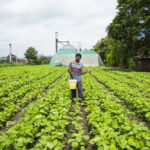Author: Chandra S. Nuthalapati

Can Gene-Edited Crops Revolutionize Agriculture in Developing Countries?
The emergence of gene-editing technologies, particularly CRISPR-Cas9, has ushered in new possibilities for transformative advancements in agriculture, healthcare and environmental sustainability. The discovery of CRISPR-Cas9 in 2012 has the potential to accelerate the pace of innovation and enable more precise…

Determinants and Income Effects of Small Farmers Selling to Supermarkets versus Traditional Market Channels in Four Regions of India
Abstract Read a policy brief based on this study. Using endogenous switching regressions to calculate transitional heterogeneity which we have used to build counterfactual scenarios to identify the treatment effects for both sellers to supermarkets and sellers to traditional markets, the results support neither a...

Indian Millet Cultivation Plagued by Low Yields, Prices, and Profits
Millets contribute to achieving six of the seventeen Sustainable Development Goals for 2030: zero hunger, good health and well-being, decent work and economic growth, responsible consumption and production, climate change, and life on land. In India, the gradual disappearance of…

Accelerating Varietal Turnover in Smallholder Soybean Farms
“A lack of dynamism in varietal change in food crop production represents a wasted opportunity that is potentially high, exacting a heavy toll on poor producers and consumers alike.”
–Thomas S. Walker and Jeffrey Alwang
Crop Improvement, Adoption and Impact…

Demand-Side and Supply-Side Factors for Accelerating Varietal Turnover in Smallholder Soybean Farms
Abstract The rapid growth of soybean cultivation in the world augurs well for achieving SDG2 of promoting sustainable agriculture, ending hunger, achieving food security, and improving nutrition. India started promoting soybean cultivation in the 1970s to combat dietary protein deficiencies and augment smallholders’ incomes. However,...

Farmers and Consumers Pay the Price for Burdensome GM Regulations: The Case of GM Mustard in India
Policymakers in India have taken the first step to allow commercial cultivation of genetically modified (GM) mustard. The conditional approval for the environmental release of the Dhara Mustard Hybrid (DMH)-11 and its parental events bn3.6 and modbs2.99, given by the…

Hybrid Mustard and Biotechnology: Pathways for Doubling Farmers’ Incomes and Nutritional Security
Abstract The government’s decision to move ahead on the much-delayed genetically modified mustard developed by the University of Delhi signifies a turnaround and bodes well for the country’s food system. Numerous tests over the last 20 years prove its safety for food, feed, and the...

Nutrition-Sensitive Food Systems and Biofortified Crops
Abstract The realization that economic growth is a necessary but insufficient condition for improving the nutritional status has led to a paradigm shift in addressing malnutrition through nutrition-sensitive development. Biofortification is one such nutrition-sensitive food system intervention designed to supply crucial micronutrients through staple diets...

